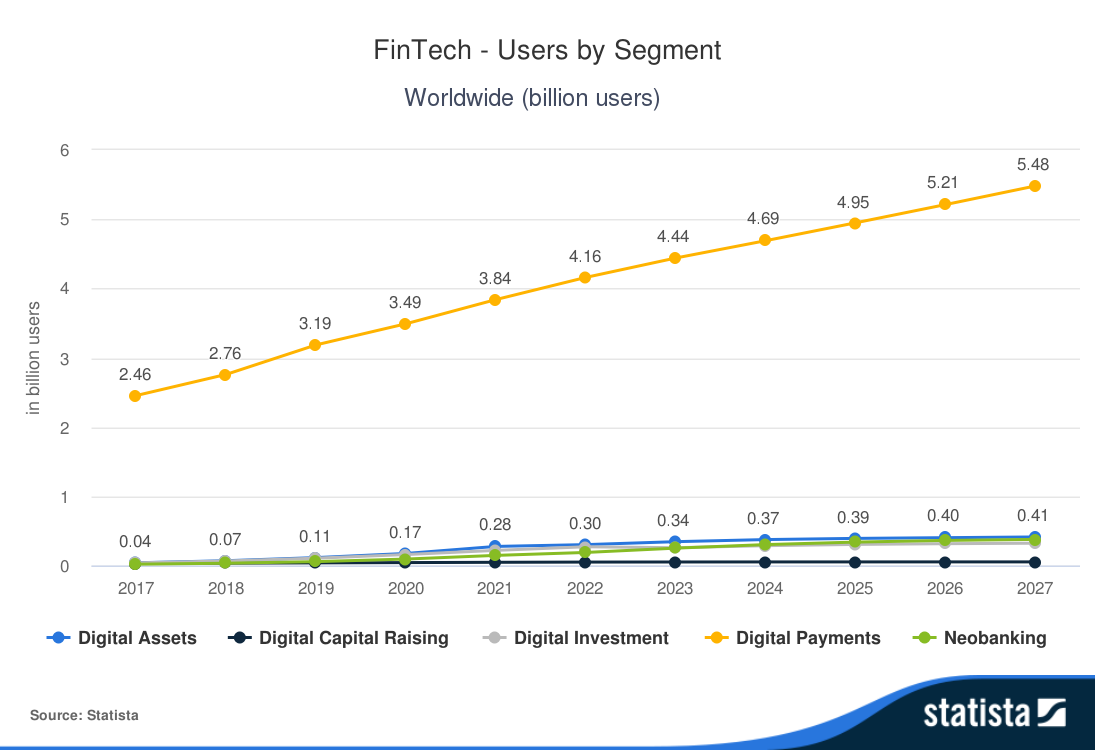- Digital capital raising (crowdinvesting/lending/funding, marketplace lending…)
- Digital investments (neobrokers, robo-advisors…)
- Digital payments (Mobile POS payments, digital remittances, digital commerce…)
- Neobanking
- Digital assets (NFTs, cryptocurrencies…)
A growing industry

Interestingly, digital payments tops an estimated 5.5 billion users worldwide in 2027 according to Statista (February 2023 data), as illustrated below:

When it comes to transaction value per user on average worldwide, neobanking and digital investments top it all by far with respectively a projected transaction value per user of 22 450 € and 15 220 € in 2027, as the graph below illustrates:

Significant impacts of fintech
One of the most significant impacts of fintech has been the democratization of financial services. Fintech companies have made it possible for people who were previously underserved by traditional financial institutions to access financial services. For example, people who don’t have a traditional bank account can use mobile banking apps to manage their money. Fintech companies have also made it easier for people to access credit and loans, which can be especially important for small business owners and entrepreneurs.
Fintech has also made financial services more convenient and accessible. For example, people can use mobile payment apps like Venmo or PayPal to easily send money to friends and family. Fintech has also made it easier to invest and save money. People can use robo-advisors to manage their investments or use savings apps that round up their purchases and invest the spare change.
Another important aspect of fintech is the use of blockchain technology. Blockchain is a decentralized ledger that allows for secure and transparent transactions. Fintech companies are using blockchain to create new financial products and services, such as cryptocurrencies and smart contracts.
Fintech is also changing the way traditional financial institutions operate. Banks and other financial institutions are investing in fintech companies or creating their own fintech solutions to stay competitive. This has led to increased collaboration between traditional financial institutions and fintech startups.
Fintech limits and disadvantages
Fintech is not without its challenges. One of the biggest concerns is cybersecurity. Fintech companies store sensitive financial information, and any data breaches could have serious consequences for consumers. There are also concerns about the lack of regulation in the fintech industry, as some fintech companies operate outside of traditional financial regulations.
In brief, potential disadvantages to consider include:
- Cybersecurity risks: As FinTech relies heavily on technology, there is always the risk of cyber attacks, data breaches, and other security threats. This can put sensitive financial information and personal data at risk.
- Limited human interaction: FinTech services are often fully automated, which means there may be limited human interaction or customer support. This can lead to misunderstandings or difficulties in resolving issues that require a personal touch.
- Exclusion of vulnerable groups: Not everyone has access to the internet, smartphones, or other technologies required to use FinTech services. This can lead to exclusion of vulnerable groups, such as elderly or low-income individuals, who may rely on traditional banking services.
- Dependency on technology: FinTech services are highly dependent on technology, which means that any system failures or technical glitches can cause disruptions or service outages.
- Lack of regulation: The regulatory landscape for FinTech is still evolving and in some cases, may be unclear or insufficient. This can lead to uncertainty for both service providers and consumers.
To conclude
In conclusion, as mentioned above, fintech is a rapidly growing industry that is changing the way people interact with their money. Fintech companies are providing faster, more convenient, and cost-effective financial solutions, democratizing financial services and making them accessible to people who were previously underserved. Fintech is also changing the way traditional financial institutions operate, leading to increased collaboration between the two. While there are concerns about cybersecurity, regulation and other disadvantages, the benefits of fintech are clear, and the industry is set to continue growing in the years to come.
Sources : Statista (February 2023).
DISCLAIMER: This article is informative and should not be considered as a legal, tax or any other advice or opinion. We strongly advise you to contact our experts at Monaco Private Advisory Multi-Family Office (MPA MFO) for an accurate assessment of your situation.
